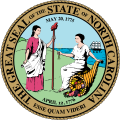R. Gregg Cherry
R. Gregg Cherry | |
|---|---|
 R. Gregg Cherry, 1945 | |
| 61st Governor of North Carolina | |
| In office January 4, 1945 – January 6, 1949 | |
| Lieutenant | Lynton Y. Ballentine |
| Preceded by | J. Melville Broughton |
| Succeeded by | W. Kerr Scott |
| Member of the North Carolina Senate from the 26th district | |
| In office November 5, 1940 – November 7, 1944 | |
| Preceded by | J. H. Separk |
| Succeeded by | Stephen B. Dolley |
| Chair of the North Carolina Democratic Party | |
| In office July 30, 1937 – August 14, 1940 | |
| Preceded by | J. Wallace Winborne |
| Succeeded by | Emery B. Denny |
| Speaker of the North Carolina House of Representatives | |
| In office December 10, 1936 – January 4, 1939 | |
| Preceded by | R. Grady Johnson |
| Succeeded by | D. L. Ward |
| Member of the North Carolina House of Representatives from Gaston County | |
| In office November 4, 1930 – November 5, 1940 | |
| Succeeded by | Basil Whitener |
| 25th Mayor of Gastonia | |
| In office 1919–1923 | |
| Preceded by | Arthur M. Dixon |
| Succeeded by | B. H. Parker |
| Personal details | |
| Born | Robert Gregg Cherry October 17, 1891 York County, South Carolina, U.S. |
| Died | June 25, 1957 (aged 65) Gastonia, North Carolina, U.S. |
| Political party | Democratic |
| Spouse | |
| Education | Duke University |
| Military service | |
| Branch/service | United States Army |
| Battles/wars | |
Robert Gregg Cherry (October 17, 1891 – June 25, 1957) was an American politician and lawyer who served as the 61st governor of the U.S. state of North Carolina from 1945 to 1949.
Early life and family
[edit]Childhood, education, and military service
[edit]Born in York County, South Carolina near Rock Hill, Cherry grew up in Gastonia, North Carolina with relatives after the death of his parents. He earned bachelor's and law degrees at Trinity College (now Duke University).[1] He organized and led a volunteer artillery company during World War I.
Marriage
[edit]In 1921, he married Lula Mildred Stafford, the daughter of the Mayor of Greensboro Emory Junius Stafford.[2]
Career
[edit]Cherry served as mayor of Gastonia from 1919 to 1923,[3] as a member and speaker of the North Carolina House of Representatives, as chairman of the North Carolina Democratic Party (1937–1940), and as a member of the North Carolina Senate. In Gastonia, it was joked that he was the best lawyer in town when sober, and the second-best lawyer in town when drunk.[4]
In 1944, Cherry was elected governor as the last in a series of governors affiliated with the political machine of former governor O. Max Gardner.[5] He was sworn in on January 4, 1945.[6] Cherry inherited an economy facing material and labor shortages as a result of the ongoing Second World War. One of his primary focuses during his term was the improvement of mental health care at state-run facilities. Cherry Hospital in Goldsboro, North Carolina, is named for him.
Unlike other Southern Democrats, Cherry, despite his segregationist views, supported Harry S. Truman for re-election in 1948 and did not join the Dixiecrats.[7] He was succeeded by W. Kerr Scott on January 6, 1949.[6] He retired from politics and returned to the practice of law.
References
[edit]- ^ "North Carolina manual [serial]". 1916.
- ^ Ham, Marie Sharpe; Blake, Debra A.; Morris, C. Edwards (2000). North Carolina's First Ladies 1891-2001, Who Have Resided in the Executive Mansion At 200 North Blount Street. Raleigh, North Carolina: The North Carolina Executive Mansion Fine Arts Committee and the North Carolina Executive Mansion Fund, Inc. pp. 51–52. ISBN 0-86526-294-2.
- ^ "Robert Gregg Cherry". January 5, 2013.
- ^ Tar Heel Laughter By Richard Walser
- ^ Christensen, Rob. The Paradox of Tar Heel Politics. 2008. UNC Press.
- ^ a b Cheney 1981, p. 423.
- ^ "R. Gregg Cherry (O-56) | NC DNCR". www.dncr.nc.gov. January 19, 2024. Retrieved March 29, 2025.
Works cited
[edit]- Cheney, John L. Jr., ed. (1981). North Carolina Government, 1585-1979 : A Narrative and Statistical History (revised ed.). Raleigh: North Carolina Secretary of State. OCLC 1290270510.
External links
[edit]- Works by or about R. Gregg Cherry at the Internet Archive
- OurCampaigns.com biography
- National Governors Association biography[permanent dead link]
- North Carolina Historical Marker Archived February 16, 2012, at the Wayback Machine
- 1891 births
- 1957 deaths
- American segregationists
- Duke University Trinity College of Arts and Sciences alumni
- Democratic Party governors of North Carolina
- North Carolina Democratic Party chairs
- North Carolina lawyers
- Democratic Party North Carolina state senators
- People from Gastonia, North Carolina
- Speakers of the North Carolina House of Representatives
- Democratic Party members of the North Carolina House of Representatives
- 20th-century American lawyers
- Mayors of places in North Carolina
- Members of Sons of Confederate Veterans
- 20th-century members of the North Carolina General Assembly
- North Carolina politician stubs

